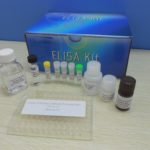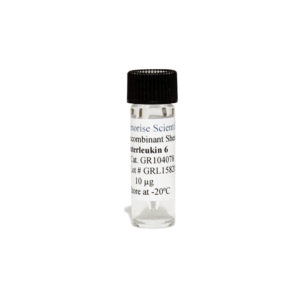Recombinant Equine TNFa Protein
$99.00 – $456.00
The recombinant equine TNFa protein is derived from in vitro expression of equine TNFa gene in E. coli and purified using his-tag affinity column and can be used in multiple applications such as cell culture, ELISA and western blot.
Alternative names for TNFa: Tumor necrosis factor alpha
This product is for Laboratory Research Use Only not for diagnostic and therapeutic purposes or any other purposes.
- Description
- Product Citations
- Reviews (0)
Description
Genorise Recombinant Equine TNFa Protein Summary
Alternative names for TNFa: Tumor necrosis factor alpha
Product Specifications
| Purity | > 96%, by SDSPAGE under reducing conditions and visualized by silver stain. |
| Endotoxin Level | < 0.1 EU per 1 μg of the protein by the LAL method. |
| Activity | Measured by its ability to inhibit TNF-a mediated cytotoxicity in the L-929 mouse fibroblast cells in the presence of the metabolic inhibitor actinomycin D. Matthews N and Neale ML (1987) in Lymphokines and Interferons, A practical Approach. Clemens MJ et al. (eds): IRL Press. 221.
The ED50 for this effect is 0.05-0.1 µg/ml in the presence of 0.25 ng/ml of rhTNF-a. |
| Source | E. coli derived equine TNFa. |
| Accession # | NP_001075288.1 |
| N-Terminal Sequence Analysis | Leu |
| Amino Acid Sequence | Leu78-Leu234 |
| Predicted Molecular Mass | 17 kDa |
| SDS-PAGE | 17 kDa, reducing conditions |
Background:
TNF-α, the prototypical member of the TNF protein superfamily, is a homotrimeric type-II membrane protein (1, 2). Membrane bound TNF-α is cleaved by the metalloprotease TACE/ADAM17 to generate a soluble homotrimer (2). Both membrane and soluble forms of TNF-α are biologically active. TNF-α is produced primarily by macrophages, but it is produced also by a broad variety of cell types including lymphoid cells, mast cells, endothelial cells, cardiac myocytes, adipose tissue, fibroblasts, and neuronal tissue (1). Cellular response to TNF-α is mediated through interaction with receptors TNF-R1 and TNF-R2 and results in activation of pathways that favor both cell survival and apoptosis depending on the cell type and biological context. Activation of kinase pathways (including JNK, ERK (p44/42), p38 MAPK and NF-κB) promotes the survival of cells, while TNF-α mediated activation of caspase-8 leads to programmed cell death (1,2). TNF-α plays a key regulatory role in inflammation and host defense against bacterial infection, notably Mycobacterium tuberculosis (3). TNF-α causes many of the clinical problems associated with autoimmune disorders such as rheumatoid arthritis, ankylosing spondylitis, inflammatory bowel disease, psoriasis, hidradenitis suppurativa and refractory asthma. The role of TNF-α in autoimmunity is underscored by blocking TNF-α action to treat rheumatoid arthritis and Crohn’s disease (1, 2, 4).
References
- Aggarwal, B.B. (2003) Nat Rev Immunol 3, 745-56.
- Hehlgans, T. and Pfeffer, K. (2005) Immunology 115, 1-20.
- Lin, P.L. et al. (2007) J Investig Dermatol Symp Proc 12, 22-5.
- Brennan, F.M. and McInnes, I.B. (2008) J Clin Invest 118, 3537-45.
Product Citations
Be the first to review “Recombinant Equine TNFa Protein”
You must be logged in to post a review.


























Reviews
There are no reviews yet.